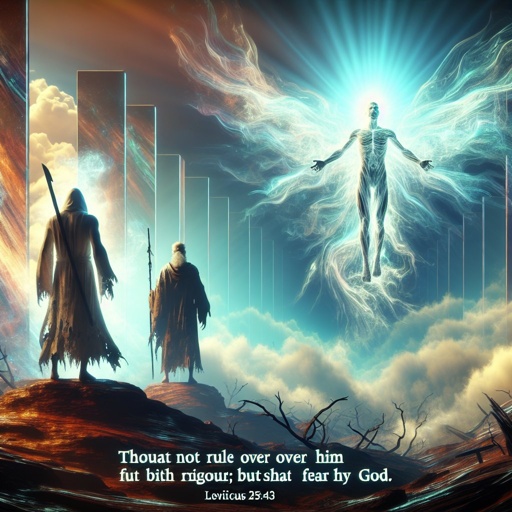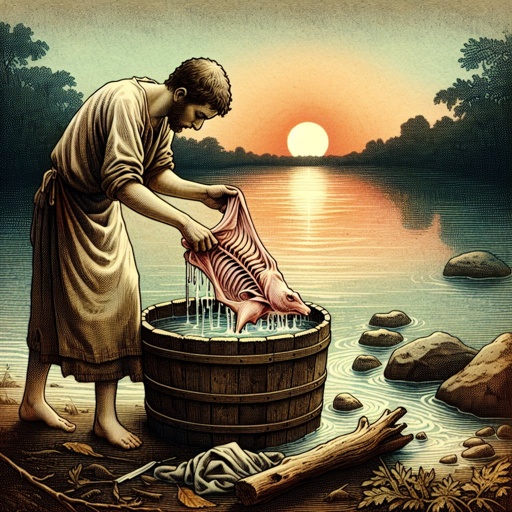What does Leviticus 16:25 mean?
"And the fat of the sin offering shall he burn upon the altar." - Leviticus 16:25

Leviticus 16:25 - "And the fat of the sin offering shall he burn upon the altar."
Leviticus 16:25 in the King James Version of the Bible reads, "And the fat of the sin offering shall he burn upon the altar." This verse is a part of the instructions given to the Israelites by God through Moses regarding the observance of the Day of Atonement, or Yom Kippur. The Day of Atonement was an annual event in which the high priest would make atonement for the sins of the entire nation of Israel. This verse specifically addresses the disposal of the fat from the sin offering made on that day.
In order to truly understand the meaning and significance of this verse, it is important to consider the historical and cultural context of the Israelites at the time. The Israelites were a people who had been brought out of slavery in Egypt by God and were now living in the wilderness on their way to the Promised Land. As a way of maintaining their relationship with God and seeking forgiveness for their sins, God established a system of sacrifices and offerings that were to be made by the Israelites.
The sin offering mentioned in Leviticus 16:25 was a central part of the sacrificial system. The fat of the sin offering was to be burned on the altar as a way of symbolizing the complete and total surrender of the sin offering to God. Burning the fat was a way of demonstrating that the entire offering belonged to God and was being presented to Him as a way of seeking forgiveness and reconciliation.
The act of burning the fat on the altar also served as a visible and tangible way for the Israelites to understand the seriousness of sin and the need for repentance. The burning fat was a vivid reminder of the consequences of sin and the need for atonement. It was a way of impressing upon the people the gravity of their transgressions and the importance of seeking forgiveness and reconciliation with God.
The fat of the sin offering was also seen as a way of honoring and glorifying God. In the biblical context, fat was often seen as the best part of the animal, and burning it on the altar was a way of demonstrating the Israelites' willingness to give God their best. By burning the fat of the sin offering on the altar, the Israelites were acknowledging God's holiness and their need to honor Him with their sacrifices.
From a symbolic perspective, the burning of the fat on the altar can be seen as a representation of the purifying and sanctifying work of God. Just as the burning of the fat consumed the offering and transformed it into smoke and ashes, so too does God's atoning work consume and transform the sins of His people. The act of burning the fat on the altar served as a visible reminder of God's ability to cleanse and purify his people, allowing them to be reconciled to Him.
In the New Testament, the sacrificial system outlined in Leviticus is seen as pointing forward to the ultimate sacrifice of Jesus Christ. The book of Hebrews makes clear connections between the Day of Atonement and the atoning work of Jesus on the cross. Jesus, described as the perfect High Priest, offered Himself as the ultimate sin offering, once and for all, to atone for the sins of humanity.
In conclusion, Leviticus 16:25 and the overall context of the Day of Atonement provide a rich and profound picture of the Israelites' need for forgiveness and reconciliation with God, as well as a foreshadowing of the ultimate sacrifice of Jesus Christ. The burning of the fat on the altar served as a powerful symbol of the Israelites' need to surrender their sins to God, seek purification, and honor Him with their sacrifices. It also points forward to the redemptive work of Jesus and the ultimate atonement that He provides for all who believe in Him.
Leviticus 16:25 Artwork

Leviticus 16:25 - "And the fat of the sin offering shall he burn upon the altar."

Leviticus 25:16 - "According to the multitude of years thou shalt increase the price thereof, and according to the fewness of years thou shalt diminish the price of it: for according to the number of the years of the fruits doth he sell unto thee."

Leviticus 25:26 - "And if the man have none to redeem it, and himself be able to redeem it;"

Leviticus 25:34 - "But the field of the suburbs of their cities may not be sold; for it is their perpetual possession."

Leviticus 25:1 - "And the LORD spake unto Moses in mount Sinai, saying,"

Leviticus 21:16 - "¶ And the LORD spake unto Moses, saying,"

Numbers 25:16 - "¶ And the LORD spake unto Moses, saying,"

Leviticus 25:24 - "And in all the land of your possession ye shall grant a redemption for the land."

Leviticus 9:16 - "And he brought the burnt offering, and offered it according to the manner."

Leviticus 25:13 - "In the year of this jubile ye shall return every man unto his possession."

Leviticus 25:23 - "¶ The land shall not be sold for ever: for the land is mine; for ye are strangers and sojourners with me."

Leviticus 25:7 - "And for thy cattle, and for the beast that are in thy land, shall all the increase thereof be meat."

Leviticus 25:43 - "Thou shalt not rule over him with rigour; but shalt fear thy God."

Leviticus 11:16 - "And the owl, and the night hawk, and the cuckow, and the hawk after his kind,"

Leviticus 4:16 - "And the priest that is anointed shall bring of the bullock's blood to the tabernacle of the congregation:"

Leviticus 25:32 - "Notwithstanding the cities of the Levites, and the houses of the cities of their possession, may the Levites redeem at any time."

Leviticus 27:25 - "And all thy estimations shall be according to the shekel of the sanctuary: twenty gerahs shall be the shekel."

Leviticus 18:16 - "Thou shalt not uncover the nakedness of thy brother's wife: it is thy brother's nakedness."

Leviticus 16:12 make the censor obvious. Make the Priest a Hebrew, and have his Garments on.

Leviticus 25:12 - "For it is the jubile; it shall be holy unto you: ye shall eat the increase thereof out of the field."

Leviticus 25:40 - "But as an hired servant, and as a sojourner, he shall be with thee, and shall serve thee unto the year of jubile:"

Leviticus 25:25 - "¶ If thy brother be waxen poor, and hath sold away some of his possession, and if any of his kin come to redeem it, then shall he redeem that which his brother sold."

Leviticus 25:42 - "For they are my servants, which I brought forth out of the land of Egypt: they shall not be sold as bondmen."

Leviticus 11:25 - "And whosoever beareth ought of the carcase of them shall wash his clothes, and be unclean until the even."

Leviticus 25:48 - "After that he is sold he may be redeemed again; one of his brethren may redeem him:"

Leviticus 25:19 - "And the land shall yield her fruit, and ye shall eat your fill, and dwell therein in safety."

Leviticus 25:36 - "Take thou no usury of him, or increase: but fear thy God; that thy brother may live with thee."

Genesis 25:16 - "These are the sons of Ishmael, and these are their names, by their towns, and by their castles; twelve princes according to their nations."

Proverbs 16:25 - "There is a way that seemeth right unto a man, but the end thereof are the ways of death."

Leviticus 25:37 - "Thou shalt not give him thy money upon usury, nor lend him thy victuals for increase."